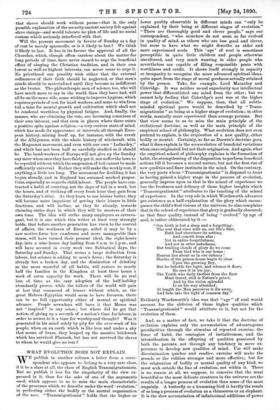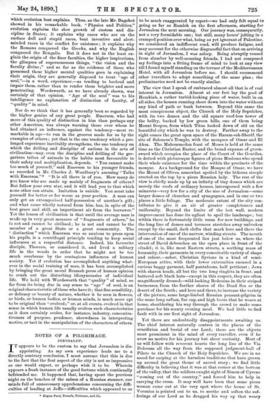WHAT EVOLUTION DOES NOT EXPLAIN.
WE publish in another column a letter from a corre- spondent who appears to belong to a very rare class, if it be a class at all, the class of English Transmigrationists. But we publish it less for the singularity of the view ex- pressed in it, than for the sake of one of the arguments used, which appears to us to miss the main characteristic of the processes which we describe under the word evolution,' in perfecting either the bodily or the mental organisation of the race. " Transmigrationist" holds that the higher or lower quality observable in different minds can "only be explained by their being at different stages of evolution."
"There are thoroughly good and clever people," says our correspondent, "who somehow do not seem so far evolved in quality of mind, as others who are less good and clever, but seem to have what we might describe as older and more experienced souls. This 'age' of soul is sometimes perceptible in quite little children and people otherwise uncultured, and 'very much wanting in elder people who nevertheless are capable of filling responsible posts with worthiness and credit. It shows itself strongly in capacity or incapacity to recognise the more advanced spiritual ideas, quite apart from the stage of moral goodness actually attained by the person. Take, for example, Lord Macaulay and Coleridge. It was neither moral superiority nor intellectual power that differentiated one mind from the other ; but we cannot help feeling that Coleridge's soul was at the higher stage of evolution." We suppose, then, that all subtle- minded spiritual poets would be described by " Trans- migrationist " as being at a higher stage of evolution ; in other words, mentally more experienced than average persons. But that view seems to us to miss the main principle of the evolutional doctrine, as well as the main principle of the empirical school of philosophy. What evolution does not even pretend to explain, is the origination of a new quality, either bodily or mental. Certainly, so far as Darwin's doctrine goes, what it does explain is the accumulation of beneficial variations when once originated, but not their origination. And again, what the empirical school of philosophy explains is the formation of habit, the atrengthening of the disposition to perform beneficial actions till it becomes a second nature, but not the first rise of new qualities and finer instincts in the mind. On the contrary, the very poets whom " Transmigrationist " is disposed to treat as having gained a higher stage in the process of evolution, generally impress upon us that in the school of experience we lose the freshness and delicacy of those higher insights which " Transmigrationist " attributes to the teaching of the school of experience. In the very ode in which Wordsworth advances pre-existence as a half-explanation of the glory which encom- passes the child's first visions of the universe, be also complains that in the school of experience that glory is gradually obscured; so that finer quality, instead of being " evolved " by age of soul, is rather obliterated by it :— " Our birth is but a sleep and a forgetting :
The soul that rises with us, our life's Star,
Hath had elsewhere its setting, And cometh from afar; Not in entire forgetfulness, And not in utter nakedness, But trailing clouds of glory do we come From God who is our home : Heaven lies about us in our infancy !
Shades of the prison-house begin to close
-Upon the growing Boy,
But he beholds the light, and whence it flows, He sees it in his joy ; The Youth who daily farther from the East Must travel, still is Nature's priest, And by the vision splendid Is on his way attended; At length the Man perceives it die away, And fade into the light of common day."
Evidently Wordsworth's idea was that " age " of soul would account for the oblivion of those higher qualities which " Transmigrationist " would attribute to it, but not for the evolution of them.
And, as a matter of fact, we take it that the doctrine of evclution explains only the accumulation of advantageous peculiarities through the stimulus of repeated exercise, the force of habit, the contagion of imitativeness, and the intensification in the offspring of qualities possessed by both the parents, not through any tendency in mere ex- perience to develop new qualities of mind. Use will make discrimination quicker and readier, exercise will make the muscle or the volition stronger and more effective; but for the origination of bodily or mental quality of any kind, we must seek outside the line of evolution, not within it. There is no reason at all, we suppose, to conceive that the most beautiful or the most delicate creatures in the universe are the results of a longer process of evolution than some of the most ungainly. A butterfly or a humming-bird is hardly the result of so long a process of evolution as a rhinoceros or an elephant. It is the slow accumulation of infinitesimal additions of power which evolution best explains. Thus, as the late Mr. Bagehot showed in his remarkable book, "Physics and Politics," evolution explains the slow growth of custom and dis- cipline in States; it explains why races who are on the surface dull and stupid races, beat inventive and alert. minded races in the conflict for existence ; it explains why the Romans conquered the Greeks, and why the English -conquered the Bengalis. But it does not in the least ex- plain the origin of the finer faculties, the higher inspirations, the glimpses of supersensuous things, "the vision and the faculty divine.;" and so far as the evidence of those who possessed these 'higher mental qualities goes in explaining their origin, they are generally disposed to treat "age of soul,"—in a word, experience,—as tending to becloud and impair them, rather than to render them brighter and more penetrating. Wordsworth, as we have already shown, was certainly of that opinion. "Age of the soul" was to his intelligence no explanation of distinction of faculty, of " quality " in mind.
Nor do we think that it has generally been so regarded by the higher genius of any great people. Emerson, who had more of this quality of distinction in him than perhaps any other American, was always warning those over whom he had obtained an influence, against the tendency—most re- markable in age—to run in the grooves made for us by the examples of others ; yet that is the one tendency which a pro- longed experience inevitably strengthens, the one tendency on which the drilling and discipline of nations in the arts of civilisation—nay, even the discipline and drilling of the gre- garious tribes of animals in the habits most favourable to their safety and multiplication, depends. "You cannot make too much of yourself," said Emerson to his younger friends, as recorded in Mr. Charles J. Woodbury's amusing "Talks with Emerson."* "It is all there is of you. How many do you know who are made up mainly of fragments of others ? But follow your own star, and it will lead you to that which none other can attain. Imitation is suicide. You must take yourself for better or for worse as your portion. A man can only get an extemporised half-possession of another's gift ; and what came wholly natural from him, has, in spite of the best grace and skill, an impertinent air from the borrower." Yet the lesson of civilisation is that until the average man is made up in very great measure of "fragments of others," he is not and cannot be civilised ; he is not and cannot be the member of a great State or a great community. The 4 distinction" which Emerson was so anxious to press upon his pupils, is a centrifugal principle tending to keep social influences at a respectful distance. Indeed, his favourite disciple, Thoreau, so considered it, and lived a solitary life in the woods in order that he might not be too much overborne by the contagions influences of human society. Yet if evolution has accomplished anything what- ever in the social training of man, it has been accomplished by bringing the great moral Bramah press of human opinion to crush out the disturbing idiosyncrasies of individual life. We hold with Wordsworth that " quality " of mind, so far from its being due in any sense to " age " of soul, is an original characteristic of those who have it; that fine sensibility, or delicacy or beauty of nature, whether it be seen in flowers, or birds, or human bodies, or human minds, is much more apt to be original than "evolved;" or, at all events, evolved in that sense in which human life usually evolves such characteristics as it does certainly evolve, for instance, industry, concentra- tiveness of purpose, prudence, shrewdness in interpreting motive, or tact in the manipulation of the characters of others.



































 Previous page
Previous page